六年级上册英语-Module 5知识点梳理 外研社
六年级上册英语-Module5 Unit 2 I can speak French. 外研版三起

六年级上册英语-Module5 Unit 2 I can speak French. 外研版(三起)知识点概述本单元的主要内容是学习一些日常用语和能够使用外语进行简单的交流,学生将会学习到一些基础的法语单词和短语,如问候语、介绍自己等内容。
通过学习本单元,学生将会建立起初步的对外语的兴趣,也为他们今后更深入的学习奠定基础。
重点单词和短语下面是本单元中的重点单词和短语:•Speak: 讲话•French: 法语•English: 英语•Speak French: 讲法语•Hi: 嗨•Good morning: 早上好•Good afternoon: 下午好•Goodbye: 再见•Please: 请•Thank you: 谢谢•Sorry: 对不起•Excuse me: 对不起,请问词汇练习在本单元中,学生需要掌握以下单词和短语,并能够在具体语境中使用它们:1.问候语:•Good morning!早上好!•Good afternoon!下午好!•Hi!嗨!2.介绍自己:•My name is… 我的名字是…•I am… 我是…3.使用外语进行交流:•I can speak French. 我会说法语。
•Do you speak English? 你会说英语吗?•Sorry. 对不起。
•Excuse me. 对不起,请问。
4.道谢:•Thank you. 谢谢。
•You’re welcome. 不客气。
语法知识1.第一人称单数的主格和宾格在英语中,第一人称单数的主格和宾格分别是。
Module5-6外研版(三起)六年级英语上册单元知识点
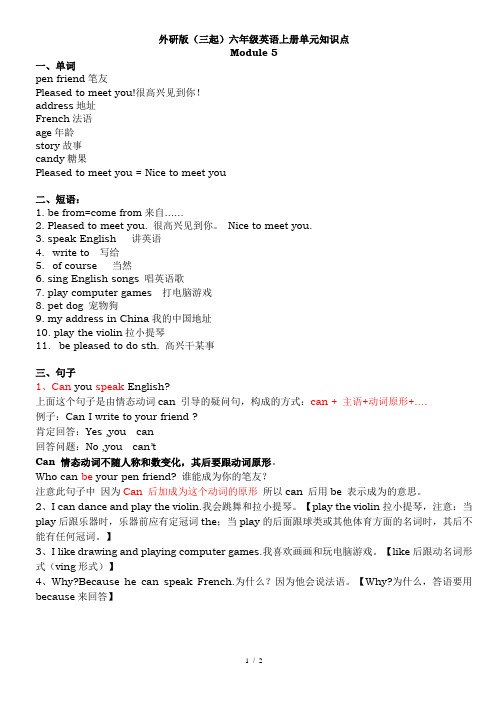
外研版(三起)六年级英语上册单元知识点Module 5一、单词pen friend笔友Pleased to meet you!很高兴见到你!address地址French法语age年龄story故事candy糖果Pleased to meet you = Nice to meet you二、短语:1.be from=come from来自......2.Pleased to meet you. 很高兴见到你。
Nice to meet you.3.speak English 讲英语4.write to 写给5.of course 当然6.sing English songs 唱英语歌7.play computer games 打电脑游戏8.pet dog 宠物狗9.my address in China我的中国地址10.play the violin拉小提琴11.be pleased to do sth. 高兴干某事三、句子1、Can you speak English?上面这个句子是由情态动词can 引导的疑问句,构成的方式:can + 主语+动词原形+….例子:Can I write to your friend ?肯定回答:Yes ,you can回答问题:No ,you can’tCan 情态动词不随人称和数变化,其后要跟动词原形。
Who can be your pen friend? 谁能成为你的笔友?注意此句子中因为Can 后加成为这个动词的原形所以can 后用be 表示成为的意思。
2、I can dance and play the violin.我会跳舞和拉小提琴。
【play the violin拉小提琴,注意:当play后跟乐器时,乐器前应有定冠词the;当play的后面跟球类或其他体育方面的名词时,其后不能有任何冠词。
】3、I like drawing and playing computer games.我喜欢画画和玩电脑游戏。
外研六上 Module 5 知识清单
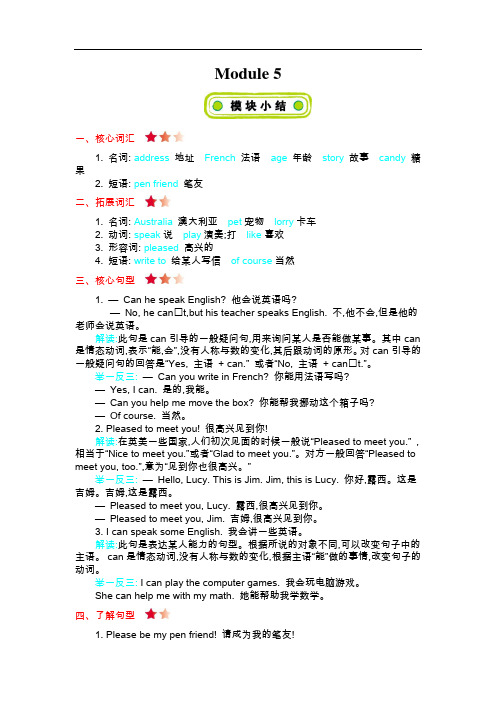
Module 5一、核心词汇1. 名词: address地址French法语age年龄story 故事candy 糖果2. 短语: pen friend 笔友二、拓展词汇1. 名词: Australia澳大利亚pet宠物lorry卡车2. 动词: speak说play演奏;打like喜欢3. 形容词: pleased 高兴的4. 短语: write to 给某人写信of course当然三、核心句型1. —Can he speak English? 他会说英语吗?—No, he can t,but his teacher speaks English. 不,他不会,但是他的老师会说英语。
解读:此句是can引导的一般疑问句,用来询问某人是否能做某事。
其中can 是情态动词,表示“能,会”,没有人称与数的变化,其后跟动词的原形。
对can引导的一般疑问句的回答是“Yes, 主语+ can.”或者“No, 主语+ can t.”。
举一反三:—Can you write in French? 你能用法语写吗?—Yes, I can. 是的,我能。
—Can you help me move the box? 你能帮我挪动这个箱子吗?—Of course. 当然。
2. Pleased to meet you! 很高兴见到你!解读:在英美一些国家,人们初次见面的时候一般说“Pleased to meet you.”,相当于“Nice to meet you.”或者“Glad to meet you.”。
对方一般回答“Pleased to meet you, too.”,意为“见到你也很高兴。
”举一反三:—Hello, Lucy. This is Jim. Jim, this is Lucy. 你好,露西。
这是吉姆。
吉姆,这是露西。
—Pleased to meet you, Lucy. 露西,很高兴见到你。
—Pleased to meet you, Jim. 吉姆,很高兴见到你。
外研版六年级上册module5~module10短语知识点总结

Module5 Unit11.there’s=there is 有...There is +可数名词单数/不可数名词There is a book. 有一本书。
There is some juice. 有一些果汁。
2.Can he speak English?(做否定回答。
)No,he can’t.3.You can speak English.(改为否定句)You can’t speak English.4.his teacher 他的老师5.speak(单三)speaks 说讲6.my cousin 我的堂兄7.be (am is are) from... 来自8.He is from China. 他来自中国。
9.I am from the UK. 我来自英国。
10.Pleased to meet you! 很高兴见到你!11.speak some English 说一些英语12.speak very good English 英语说的很好13.I’ve got=I have got 我有14.from the UK 来自英国from the US 来自美国15.two friends 两位朋友16.their 他们的17.their address 他们的地址18.write to your friends 给你的朋友们写信19.of course 当然20.want a pen friend 想要一个笔友21.be my Chinese pen friend 成为我中国的笔友22.my address 我的地址23.write in Chinese 用汉语写write in English 用英语写Module5 Unit21.want a pen friend 想要一个笔友2.write in English and Chinese用英语和汉语写write in French 用法语写3.a phone friend 一位“话”友4.Please be my pen friend!请成为我的笔友!5.like football 喜欢足球6.like +动词ing7.like reading 喜欢阅读8.like swimming 喜欢游泳9.like singing songs 喜欢唱歌10.like drawing 喜欢画画11.like playing games 喜欢玩游戏12.like riding my bicycle喜欢骑我的自行车13.like collecting stamps 喜欢集邮14.story(复数)stories 故事15.paint(动名词)painting 绘画16.my pet dog 我的宠物狗Module6 Unit11.Have you got...? 你有...吗?Yes,I have./No,I haven’t.是的,我有。
六年级上册英语五模块课文外研版

六年级上册英语五模块课文外研版由于不清楚您具体需要外研版六年级上册英语五模块课文内容的哪些学习资料(例如单词、重点句型、课文翻译等),以下为您提供该模块课文原文及重点单词、句型:一、课文原文(以Activity 1为例)Daming: Simon, what are you doing?Simon: I'm reading a book about spaceships.Daming: I'm interested in it, too. May I have a look at it?Simon: Of course. Look, this spaceship looks so cool.Daming: Yes. When was it sent into space?Simon: It was sent into space in 2003.Daming: How many countries have sent spaceships into space?Simon: Quite a few. China has sent spaceships into space, too.Daming: That's amazing. I hope to go into space one day.Simon: I hope so. Maybe we can go there together.二、重点单词。
1. spaceship(宇宙飞船)2. interested(感兴趣的),be interested in(对……感兴趣)3. send(发送,sent为过去式和过去分词),be sent into(被发送到……)三、重点句型。
1. What are you doing? (你正在做什么?)这是现在进行时的特殊疑问句,其结构为“特殊疑问词 + be动词(am/is/are)+ 主语 + 动词 - ing形式 + 其他?”2. May I...?(我可以……吗?)表示请求许可,例如May I have a look at it?(我可以看看它吗?)3. How many...?(多少……?)用于对可数名词数量的提问,如How many countries have sent spaceships into space?(有多少国家已经发射宇宙飞船到太空了?)。
外研版英语六年级上册Module 5《Unit 1 Unit 1 Can I write to he
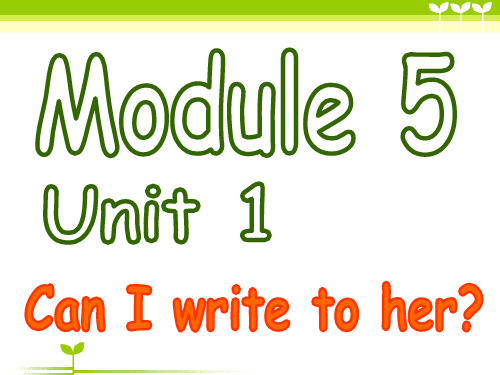
or用于否定或表转折,or 表选择,相当于中文的或者。
3) say, speak, tell 与 talk 的 区别
speak有运用语言的意思在里面。
如:speak English,speak Chinese等等。
tell有告诉,诉说的意思。
Foreign friends.
1.Where is Daming from?
2.Who is Daming visiting? 3.Where does Laura want a
pen pal from?
4.Can Lingling speak English? 5.Who will be Laura’s pen pal?
What can he do? He can play basketball.
He can
What can he do? He can run.
What can she do? She can sing.
Memory game
I can sing, she can dance, he can run.
I can’t run, she can’t sing, he can’t dance.
小结: can的用法
1) can 表示能力和请求 2) can/ can’t + 动原(动词原形) 3) can没有人称和数的变化
My pen pal
What is this dialogue about?
如:tell a story,tell me something
say是“说”的意思, 应用别人的话
如:she says……I say……
六年级上册英语课件-Module 5 模块小结 外研版(三起)PPT课件

六年级上册英语课件-Module 5 模块小结 外研版(三起)PPT课件
六年级上册英语课件-Module 5 模块小结 外研版(三起)PPT课件
模块小结
句型
I’m writing an email to my new pen friend in the UK. 我正在给我在英国的新笔友写邮件。 Tell me about your pen friend. What does he like to do? 告诉我关于你的笔友的事情,他喜欢做什么? Does he live in London? Yes, he does. 他住在伦敦吗?是的,他住那里。 Does he like going hiking? No, he doesn't. 他喜欢徒步吗?不,他不喜欢。
六年级上册英语课件-Module 5 模块小结 外研版(三起)PPT课件
六年级上册英语课件-Module 5 模块小结 外研版(三起)PPT课件
六年级(上册)
模块小结
六年级上册英语课件-Module 5 模块小结 外研版(三起)PPT课件
六年级上册英语课件-Module 5 模块小结 外研版(三起)PPT课件
模块小结
单词
Module 5
pen friend 笔友
Pleased to meet you! 很高兴见到你!
六年级上册英语课件-Module 5 模块小结 外研版(三起)PPT课件
六年级上册英语课件-Module 5 模块小结 外研版(三起)PPT课件
模块小结
句型
What do you like to do in your spare time? 你业余时间喜欢做什么? I look forward to meeting my pen friend. 我期待和我的笔友见面。
六年级上册英语教案-Module5复习课|外研社(三起)
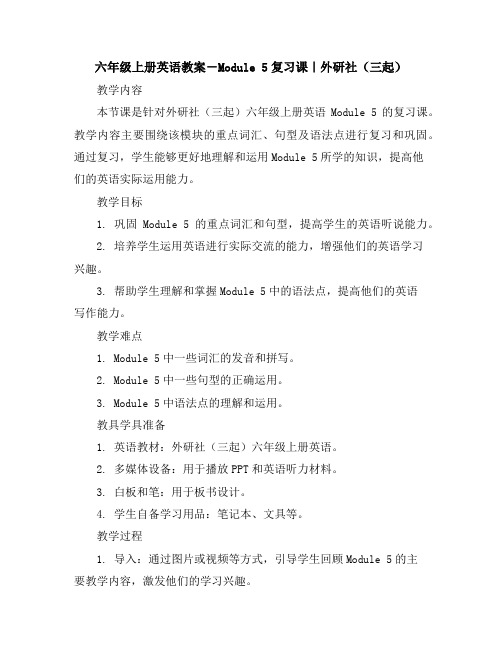
六年级上册英语教案-Module 5复习课|外研社(三起)教学内容本节课是针对外研社(三起)六年级上册英语Module 5的复习课。
教学内容主要围绕该模块的重点词汇、句型及语法点进行复习和巩固。
通过复习,学生能够更好地理解和运用Module 5所学的知识,提高他们的英语实际运用能力。
教学目标1. 巩固Module 5的重点词汇和句型,提高学生的英语听说能力。
2. 培养学生运用英语进行实际交流的能力,增强他们的英语学习兴趣。
3. 帮助学生理解和掌握Module 5中的语法点,提高他们的英语写作能力。
教学难点1. Module 5中一些词汇的发音和拼写。
2. Module 5中一些句型的正确运用。
3. Module 5中语法点的理解和运用。
教具学具准备1. 英语教材:外研社(三起)六年级上册英语。
2. 多媒体设备:用于播放PPT和英语听力材料。
3. 白板和笔:用于板书设计。
4. 学生自备学习用品:笔记本、文具等。
教学过程1. 导入:通过图片或视频等方式,引导学生回顾Module 5的主要教学内容,激发他们的学习兴趣。
2. 复习词汇:通过PPT展示Module 5的重点词汇,引导学生跟读并拼写,加强他们对词汇的记忆和理解。
3. 复习句型:通过听力材料和情景模拟等方式,引导学生复习Module 5的重点句型,提高他们的英语听说能力。
4. 语法讲解:通过PPT和实例讲解,帮助学生理解和掌握Module 5中的语法点,提高他们的英语写作能力。
5. 练习巩固:通过课堂练习和小组活动等方式,让学生运用Module 5所学的知识进行实际交流,巩固他们的学习成果。
板书设计1. Module 5的重点词汇和句型。
2. Module 5的语法点及其运用实例。
3. 课堂练习和小组活动的安排。
作业设计1. 完成Module 5的练习册相关练习。
2. 写一篇关于Module 5主题的英语短文。
3. 复习Module 5的重点词汇和句型,准备下一节课的口语展示。
外研版英语六年级上module5unit2情景交际

外研版英语六年级上module5unit2情景交际一、模块五概述Module 5 of the Foreign Language Edition English for Sixth Graders focuses on the theme of daily communication.Unit 2 is specifically designed to enhance students" practical skills in conducting conversations in English.The module aims to help students build confidence in speaking English and develop their listening and responding abilities in various situations.二、Unit 2 情景交际内容概述Unit 2 of Module 5 revolves around a series of conversations that take place in different contexts.The conversations cover various topics such as daily routines, hobbies, and plans for the future.The dialogueues present opportunities for students to practice new vocabulary, phrases, and grammar structures, enabling them to communicate more effectively in English.三、情景交际技巧解析In order to succeed in these conversations, students need to master certain communication techniques.Some of these include:1.Paying attention to the other person"s speech: Listen carefully to what the other person is saying and respond accordingly.ing appropriate body language: gestures and facialexpressions can convey meaning and enhance communication.3.Asking questions: asking relevant questions can help you understand the other person better and keep the conversation going.4.Giving opinions: expressing your opinions can help you engage in deeper discussions and share your thoughts with others.四、实战演练与策略To improve your conversational skills, it"s essential to practice regularly.Here are some practical tips and strategies:1.Role-play: pair up with a classmate and practice the conversations from the unit.Take turns speaking and listening, and provide feedback on each other"s performance.2.Listen to recordings: listen to the recorded conversations from the textbook and mimic the pronunciation, intonation, and speed of the speakers.3.Join an English-speaking club: participating in an English-speaking club or community can provide you with opportunities to practice your conversational skills with native speakers and like-minded learners.e online resources: there are numerous online platforms and apps where you can practice speaking and listening with language partners from around the world.五、总结与建议Mastering conversational skills is crucial for effective communication in English.To improve your speaking and listening abilities, focus on the following:1.Develop your vocabulary: expand your vocabulary to express yourself more accurately and naturally.2.Practice grammar: ensure you have a solid grasp of basic grammar rules to avoid confusion during conversations.3.Be confident: don"t be afraid to make mistakes when speaking English.Confidence is key to improving your communication skills.4.Immerse yourself in English: expose yourself to English language materials such as movies, songs, and books to enhance your listening and speaking abilities.By following these tips and practicing regularly, you"ll be well on your way to becoming a fluent and confident English speaker.。
外研版一起点六年级上册Module5知识点汇总
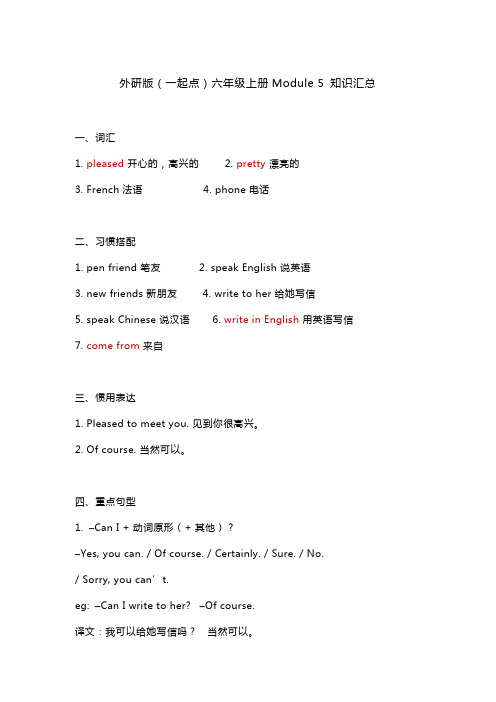
外研版(一起点)六年级上册Module 5 知识汇总一、词汇1. pleased 开心的,高兴的2. pretty 漂亮的3. French 法语4. phone 电话二、习惯搭配1. pen friend 笔友2. speak English 说英语3. new friends 新朋友4. write to her 给她写信5. speak Chinese 说汉语6. write in English用英语写信7. come from 来自三、惯用表达1. Pleased to meet you. 见到你很高兴。
2. Of course. 当然可以。
四、重点句型1. –Can I + 动词原形(+ 其他)?–Yes, you can. / Of course. / Certainly. / Sure. / No./ Sorry, you can’t.eg: –Can I write to her? –Of course.译文:我可以给她写信吗?当然可以。
–Can I go out to play with my friends? –No, you can’t.译文:我可以出去和我的朋友们玩吗?不,你不可以。
2. I want a / an + 表示国家的形容词 + pen friend.eg: I want a Chinese pen friend.译文:我想要一个中国笔友。
I want an American pen friend.译文:我想要一个美国笔友。
扩充:表达自己想要一个某国的笔友的其他句型I want a pen friend from + 国家名称.eg: I want a pen friend from the UK.译文:我想要一个来自英国的笔友。
外研一起小学英语六上教案Module5Unit

外研一起小学英语六上教案Module5Unit一、教材分析《外研社一起小学英语》是一套适用于小学英语教育的教材。
第六册主要包括Module1-Module10十个单元。
本篇文章将主要介绍第五个单元——Module5 Unit。
二、教学目标1.学生能够听懂、读懂、会说、会写以下词汇:No,I’m not. Don’t worry, You can use this one. Whose is this? Can I have a look? It’s mine. You’rewelcome.2.学生能够掌握以下重点句型: Whose is this? CanI have a look? It’s mine.3.培养学生的英语听说能力和阅读能力,提升综合能力。
三、教学方法1.任务型教学法2.实践教学法3.互动教学法四、教学内容1. 新课导入:呈现单词 No,I’m not。
运用贴图教具,引导学生进行口头反应,即鼓励学生用英语搭配动作表示No,I’m not。
2. 新知教学:扩展新词Don’t worry,You can use this one,Whose is this? Can I ha ve a look? It’s mine. You’re welcome。
新词的教学以师生对话和图片为主。
3. 知识梳理:学生在老师的引导下总结本单元所学重点句型 Whose is this? Can I have a look? It’s mine.,并进行适量书写和口头练习。
4. 教学实践:运用实际情境呈现本单元所学内容,如:张三不小心把书掉在了公园里,经过交流不断,最终让他拿回了自己的书。
5. 总结:总结本节课的内容,帮助学生理解掌握本节课所学内容。
五、教学步骤1. Warm-up小组活动:让学生在小组内自我介绍,然后介绍另一位小组成员,并用简单的句型进行交流。
2. Presentation•讲师出示图片或玩具,鼓励学生用英语进行表述。
外研版(三起)英语六年级上册Module5模块重点归纳(2020年最新)
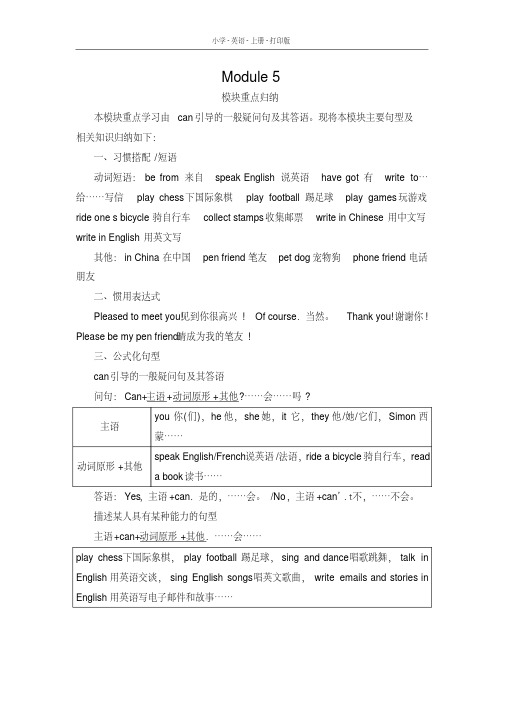
小学-英语-上册-打印版Module 5模块重点归纳本模块重点学习由can引导的一般疑问句及其答语。
现将本模块主要句型及相关知识归纳如下:一、习惯搭配/短语动词短语:be from来自speak English说英语have got有write to…给……写信play chess下国际象棋play football踢足球play games玩游戏ride one’s bicycle骑自行车collect stamps收集邮票write in Chinese用中文写write in English用英文写其他:in China在中国pen friend笔友pet dog宠物狗phone friend电话朋友二、惯用表达式Pleased to meet you!见到你很高兴! Of course.当然。
Thank you!谢谢你! Please be my pen friend!请成为我的笔友!三、公式化句型can引导的一般疑问句及其答语问句:Can+主语+动词原形+其他?……会……吗?主语you你(们),he他,she她,it它,they他/她/它们,Simon西蒙……动词原形+其他speak English/French说英语/法语,ride a bicycle骑自行车,read a book读书……答语:Yes,主语+can.是的,……会。
/No,主语+can’t.不,……不会。
描述某人具有某种能力的句型主语+can+动词原形+其他.……会……play chess下国际象棋,play football踢足球,sing and dance唱歌跳舞,talk in English用英语交谈,sing English songs唱英文歌曲,write emails and stories in English用英语写电子邮件和故事……。
最新外研版小学六年级上册英语模块小结-Module 5
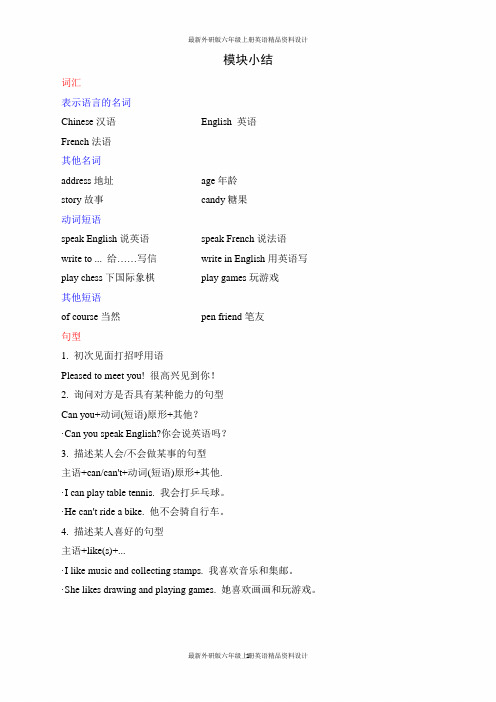
最新外研版六年级上册英语精品资料设计
最新外研版六年级上册英语精品资料设计 1 模块小结
词汇
表示语言的名词
Chinese 汉语
English 英语 French 法语
其他名词
address 地址
age 年龄 story 故事
candy 糖果 动词短语
speak English 说英语
speak French 说法语 write to ... 给……写信
write in English 用英语写 play chess 下国际象棋
play games 玩游戏 其他短语
of course 当然
pen friend 笔友
句型
1. 初次见面打招呼用语 Pleased to meet you! 很高兴见到你!
2. 询问对方是否具有某种能力的句型
Can you+动词(短语)原形+其他?
·Can you speak English?你会说英语吗?
3. 描述某人会/不会做某事的句型
主语+can/can't+动词(短语)原形+其他.
·I can play table tennis. 我会打乒乓球。
·He can't ride a bike. 他不会骑自行车。
4. 描述某人喜好的句型
主语+like(s)+...
·I like music and collecting stamps. 我喜欢音乐和集邮。
·She likes drawing and playing games. 她喜欢画画和玩游戏。
- 1、下载文档前请自行甄别文档内容的完整性,平台不提供额外的编辑、内容补充、找答案等附加服务。
- 2、"仅部分预览"的文档,不可在线预览部分如存在完整性等问题,可反馈申请退款(可完整预览的文档不适用该条件!)。
- 3、如文档侵犯您的权益,请联系客服反馈,我们会尽快为您处理(人工客服工作时间:9:00-18:30)。
1.
笔友;同义短语:
2. be from=
来自......
3.
讲英语 (speak 指“说话,发言”,强调开口说话的动
作,其宾语通常是表示某种语言的名词。)
4.
写给某人
5.
当然
6.
下象棋;
拉小提琴【注意:当 play 后跟
乐器时,乐器前应有定冠词 the;当 play 的后面跟球类或其他体育方面的名词时,其后不
A. are B. is C. be
( ) 6. I like ________ my bicycle.
A. ride B. riding C. rideing
( ) 7. We can talk ________ English.
A. in B. to C. at
( ) 8. Can I write ________ you?
5. ____________ (they) names are Mike and Bill. 三、按要求改写句子。
1. Can Tom speak English? (作肯定回答)
________, ________ ________. 2. She can play football. (改为一般疑问句)
回答: 例:Can I write to your friends? Yes, you can./ No, you can’t. 练:-你能成为我的笔友吗?-当然。
一、单项选择。
( ) 1. I like
songs.
A. sing B. sings C. singing
随堂小练
( ) 2. He can write
能有任何冠词。】
7. 三、句子
宠物狗
1.Pleased to meet you! 见到你很高兴。【同义句:Nice/Glad to meet you. “be pleased to do sth.” 表示高兴或乐意做某事】
练:我很高兴再次见到你。
2. We can write in French. 我们可以用法语写。【”in French”意为“用法语”,此处 in 表 示使用某种语言,如:in English 用英语。in 后面还可跟表示材料的名词,如:in ink 用墨 水。in 也可表示“在……里面”,如:in the room 在房间里面】 练:他昨天用英语写了封信。
外研版(三起)六年级英语上册 Module 5 知识点梳理
一、单词
1.
地址
2.
法语;还可以作为形容词,意为“法国的,法国人的”。
法国(你知道法国的首都吗?
)
3.
年龄;形近词:ago
”
the age of + 数字” 表示“在……岁的时候”
4.
故事; 复数形式:
讲故事
5. 二、短语:
糖果;复数形式:
(在本模块中是不可数名词)
________ ________ play football? 3. Nice to meet you. (改为同义句)
________ to________ you. 4. want, They, a, friend, pen, the US, from(. )(连词成句)
______________________________________________
Chinese.
A. in B. by来自C. with( ) 3. I can speak
.
A. China B. England C. English
( ) 4. My sister can speak
Chinese.
A. some B. many C. any
( ) 5. —Can you ________ my pen friend? —Yes, I can.
3.I like drawing and playing computer games.我喜欢画画和玩电脑游戏。【like 后可跟名词、 代词或动名词(v.-ing 形式)作宾语】 练:我喜欢苹果。
我非常喜欢他们。 我喜欢滑冰。 四、语法:情态动词 can 的用法 情态动词 can 表示“能够”,后要跟动词原形。没有人称和数的变化。 1.肯定句结构: 例:I can speak English. 练:她能弹钢琴。 2.否定句结构: 例:I can’t write in Chinese. 练:我们不能看电视。 3.一般疑问句结构:
1. Lily can____________ (play) chess.
2. I can't write in ____________ (China).
3. Tom ____________ (want) a pen friend.
4. I like ____________ (swim) and watching TV.
A. in B. of C. to
( ) 9. Jim ________ the UK.
A. from B. is from C. are from
( ) 10. —Can you speak English? —________.
A. Yes, I do B. No, I can C. Yes, I can 二、用所给词的正确形式填空。
